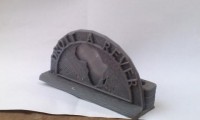Afaté Gnikou of Togo used the country’s abundance of e-waste to create a working 3D printer.
France 24 reported on the achievement of Afaté Gnikou, a geographer with no background in computer science who came across a “Mendel” self-replicating 3D printer during a workshop in August 2012 and decided to attempt to make one himself using e-waste easily accessible to people in Togo.
Gnikou explained that e-waste is a problem that “is getting worse with each passing year” in Togo, as well as in Ghana and Nigeria, with masses of used electronics shipped to the countries from Europe in containers and then “stacked in unregulated, open landfills”. A report from ‘Solving the E-waste Problem’ suggests that between 50 and 85 percent of the approximately 50 million tonnes of global e-waste ends up in these three countries, with Africa predicted to generate more e-waste than the European Union by 2017.
In response to this, Gnikou said: “I went hunting for old mainframes, discarded scanners, connection bars, and components in the landfills of Lomé. I basically took anything that could potentially be used to create the chassis and the electronic part of the printer. It took me six months to develop the first prototype. I received support from an incubator, WoeLab that is located in Djidjolé, a lower-income neighbourhood in Lomé. They got unemployed youths to come see me work and to get involved in the project.”
The first object that was printed on Gnikou’s machine was a pen holder with his motto, “right to dream”, inscribed on it, which he had designed “from A to Z” on 3D modelling software.
Gnikou added that the development phase of the machine was completed after crowd funding online helped to raise €4,316 ($5,905); with the machine able to print plastic objects ranging from “a few centimetres to a metre” in length and the first printer sold during an innovation fair in Abidjan. However, more funding is required to make the machine cheaper to buy, with the printer currently priced at €600 ($821).
Looking to the future, Gnikou plans to create a series of the machines as well as launching training workshops, with WoeLab, the company that supported him in developing the 3D printer, estimating that the project could create “up to 15,000 jobs”.

